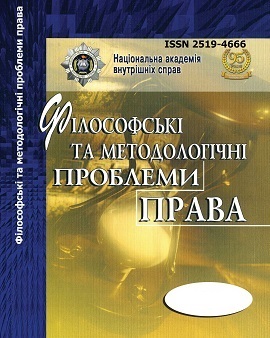Current Methods for Legal Culture Theory Creation
Abstract
The appeal to the problems of legal culture is caused by cardinal changes in the social and legal reality of modern Belarusian society, which determines the need for theoretical interpretation of the ongoing transformations, as well as the need for predicting the legal development of society. The complexity of forming this theory is linked with not only its interdisciplinary nature due to the philosophical background and close contact with the sociological, political, educational and other fields of theoretical knowledge, but also by the scale of the reflected phenomenon covering all forms and spheres of law functioning. Formation of the legal culture theory requires the establishment of its basic characteristics by identifying the relevant parameters and reflecting them in a system of logically related concepts that enable to identify systemic links between legal culture elements and, thus, assess the state and predict the ways of legal culture development of modern Belarusian society. The goal of this paper is to justify, in accordance with the general principals of knowledge, essential set of methods and research procedures for studying legal culture, by means of which legal culture theory of modern society could be formed. According to the authorʼs opinion, current methods for studying the legal culture of modern society are combined usage of the method of ascent from abstract to concrete, the method of historical and logical unity, the system method, including structural and functional approaches, the modeling method. Each method should be applied along with certain ordinance of logical actions and use of appropriate research procedures, such as formulation, concordance and systematization of concepts, scientific argumentation, classification and typology. The final goal of legal culture theory creation is establishing the essence and basic properties of given phenomenon in application to a particular social reality.
Downloads
Abstract views: 105 PDF Downloads: 159
Copyright (c) 2018 Philosophical and Methodological Problems of Law

This work is licensed under a Creative Commons Attribution-NonCommercial-NoDerivatives 4.0 International License.
- Authors reserve the right to authorship of their own work and transfer to the magazine the right of the first publication of this work under the terms of the Creative Commons Attribution License, which allows other persons to freely distribute published work with mandatory reference to authors of the original work and the first publication of an article in this magazine.
- Authors have the right to enter into separate additional agreements on non-exclusive dissemination of the work in the form in which it was published in the journal (for example, to post an article in the institution's repository or to publish as part of a monograph), provided that the link to the first publication of the work in this journal is maintained.
- The journal's policy allows and encourages the posting of articles by authors on the Internet (for example, in electronic storehouses of institutions or on personal websites), both before the submission of this manuscript to the editorial office and during its editorial processing, as this contributes to the creation of a productive scientific discussion and positively affects the efficiency and dynamics of citing the published work.




